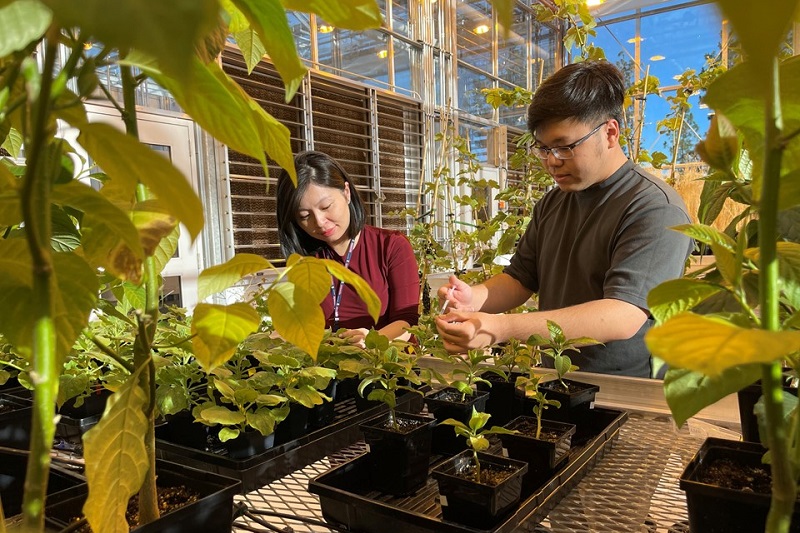BC researcher finds sustainable and economic ways to produce anti-cancer drugs from plants
10 February 2022

Dr. Thu-Thuy Dang with her student in the greenhouse at the UBC Okanagan campus. Photo credit: Trinh Don Nguyen
Award-winning biochemist and Michael Smith Health Research BC Scholar Dr. Thu-Thuy Dang has found a faster, greener and less expensive way to discover and produce plant-derived anti-cancer compounds, which can make potent drugs for colorectal, ovarian, and small cell lung cancers, more accessible.
“Ever since morphine was extracted from the opium poppy 200 years ago, researchers have been interested in knowing how to make these compounds without chemical synthesis to convert them into clinically useful drugs,” says Dr. Dang, assistant professor of biochemistry and molecular biology in the Department of Chemistry at the University of British Columbia’s Okanagan campus.
In a paper recently published online in Communications Chemistry, Dr. Dang and her team report that they have found new enzymes in plants that will make it easier to manufacture anti-cancer drugs. With support from Michael Smith Health Research BC’s Scholar award in 2020, Dr. Dang’s lab has been investigating how plants make these compounds from simple ingredients such as light, water, sugar and amino acids. This knowledge can make it easier to manipulate the production of these compounds in very mild conditions at room temperature without multi-step chemical reactions or sophisticated equipment.
The team’s findings have provided access to a suite of compounds that were not available to cancer therapists before. Therefore, the team hopes this can strengthen and diversify the pipeline of drugs.
About 60 per cent of medicinal drugs are derived from nature. Plants have biological catalysts (enzymes) that make natural medicine used to treat various human illnesses, including cancer. Among these, the “Chinese happy tree” (Camptotheca acuminata) produces the powerful cancer-killing agent, camptothecin. Converting camptothecin into drugs such as topotecan (Hycamtin) and irinotecan (Camptosar) conventionally requires labour-intensive and unsustainable processes that use toxic chemicals from petroleum sources.
“This process is greener, more sustainable and we hope that it will ultimately make anti-cancer drugs more accessible for people who need them,” says Dr. Dang.
She credits sequencing technology for significantly reducing the number of years it takes to understand how plants make one compound.
“Dr. Dang’s contributions to the field of plant-based medicine are truly inspirational,” says Dr. Chonnettia Jones, VP, Research, Michael Smith Health Research BC. “Her latest findings further validate our longstanding commitment to support exceptional health research talent in the province who are finding cures, developing new treatments, and advancing new life-saving technologies to improve the health of British Columbians. I hope Dr. Dang’s story inspires others to pursue their dreams in health research.”
The University of British Columbia has recently filed a provisional patent on Dr. Dang’s discovery and use of the new enzymes to manufacture anti-cancer drugs, which make up a multi-billion-dollar industry worldwide.





